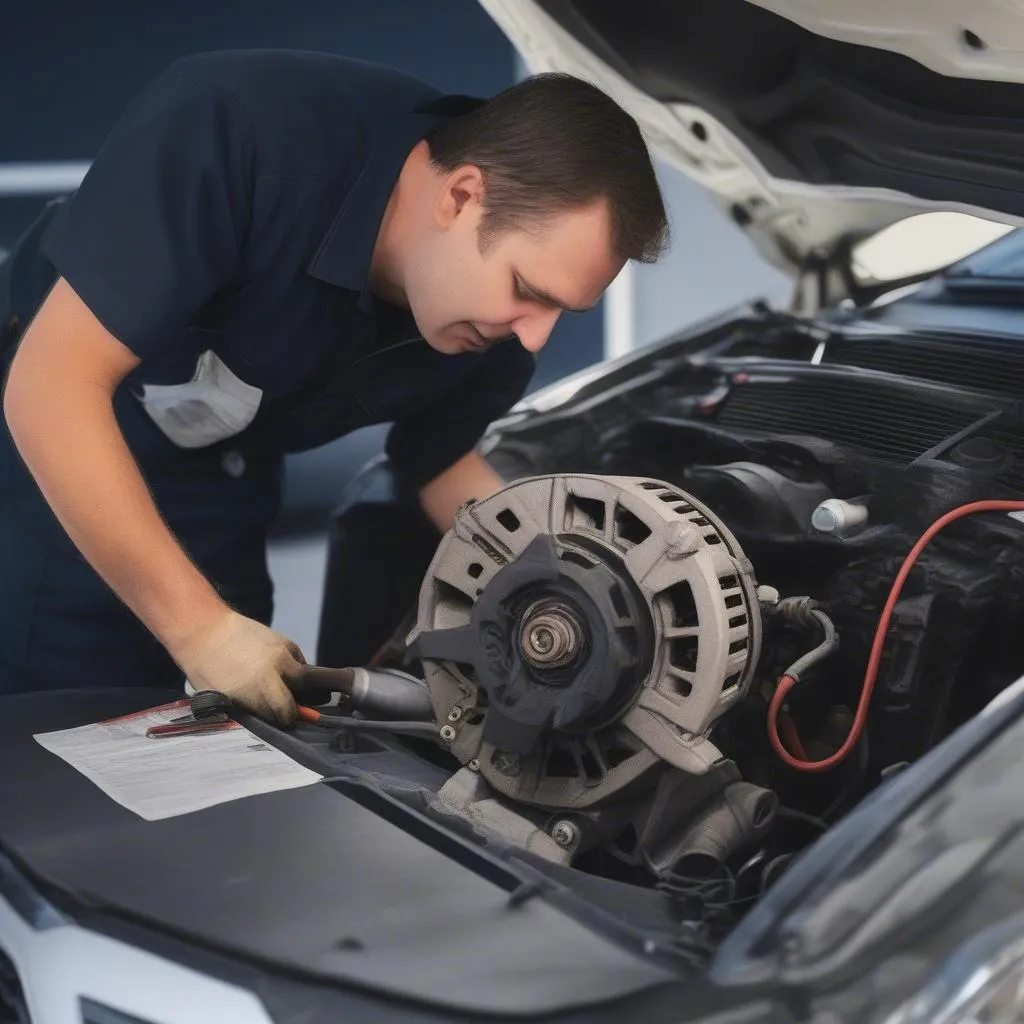Have you ever been driving down the road, enjoying your favorite tunes, when suddenly your car starts making strange noises, the lights dim, and your dashboard lights up like a Christmas tree? You might be experiencing alternator problems.
The alternator is an essential component in your car’s electrical system. It’s responsible for charging your battery and powering all the electrical components in your car. Without a functioning alternator, your car will eventually die, leaving you stranded on the side of the road.
Understanding the Importance of the Alternator
Imagine your car’s electrical system as a delicate ecosystem. The battery is like a small reservoir of power, holding a limited amount of energy. The alternator acts as the power plant, continuously replenishing the battery and supplying power to everything from your headlights and radio to your engine.
“Think of the alternator as the heart of your car’s electrical system,” says Mark Johnson, a renowned automotive engineer from Germany. “Without it, your car’s vital organs will cease to function.”
How to Tell If Your Alternator is Bad: Signs and Symptoms
If your alternator is failing, you’ll notice several signs. The most common ones include:
1. Dimming Lights
One of the first signs of a failing alternator is dimming headlights or interior lights, especially when you turn on your headlights, air conditioner, or other accessories. This indicates that the alternator is not producing enough power to meet the demands of your car’s electrical system.
2. Battery Warning Light
The battery warning light on your dashboard is a clear indication that something is wrong with your charging system. If it’s on, it means the alternator isn’t charging the battery properly. This could be due to a faulty alternator, a bad battery connection, or a problem with the wiring.
3. Unusual Noises
A failing alternator can sometimes make unusual noises, such as a whining or grinding sound. This is often due to the alternator’s bearings failing or the belt slipping.
4. Car Won’t Start
In severe cases, a completely failed alternator will prevent your car from starting. This is because the battery will be completely drained without the alternator’s charging power.
The Trouble-Shooting Process: How to Verify Your Diagnosis
If you suspect your alternator is failing, there are a few things you can do to verify your diagnosis:
1. Check the Battery Voltage
Use a voltmeter to check the battery voltage with the engine off and then again with the engine running. If the voltage drops significantly when the engine is running, it’s a good indicator that your alternator isn’t charging the battery properly.
2. Inspect the Alternator Belt
Check the alternator belt for any signs of wear, cracks, or fraying. A worn belt can slip and prevent the alternator from generating enough power.
3. Check for Corrosion
Inspect the alternator’s wiring and connections for any signs of corrosion. Corrosion can prevent electrical current from flowing properly and lead to alternator problems.
Common Questions and Answers
Q: Will a bad alternator cause my car to not start?
A: Yes, a completely failed alternator can prevent your car from starting because the battery will be drained without the alternator’s charging power. However, it’s important to note that other issues, such as a dead battery, faulty starter, or fuel problems, can also cause your car not to start.
Q: How long can a car run with a bad alternator?
A: This depends on the severity of the alternator problem and how much power your car is consuming. A partially functioning alternator might allow your car to run for a few hours or even days. However, a completely failed alternator will likely cause your car to die within minutes or hours.
Q: How much does it cost to replace an alternator?
A: The cost of replacing an alternator varies depending on the make and model of your car. You can expect to pay anywhere from $200 to $600 for the part itself, plus labor costs for installation.
Tips and Advice
1. Preventative Maintenance
Regularly inspect your alternator belt for wear and tear. If the belt is cracked, frayed, or showing signs of age, replace it.
2. Don’t Ignore Warning Signs
If you notice any of the symptoms mentioned above, don’t ignore them. A faulty alternator can lead to bigger problems and costly repairs down the road.
3. Don’t Delay Replacement
Once you’ve confirmed your alternator is bad, don’t delay replacing it. A faulty alternator can leave you stranded and damage your battery.
More Information
For more information on how to diagnose and repair automotive electrical problems, visit our website: https://diagxcar.com/alternator-or-battery/
Need Help? Contact Us
If you have any questions or need assistance diagnosing or repairing your car’s electrical system, feel free to contact us via Whatsapp: +84767531508. Our team of automotive experts is available 24/7 to help you.



